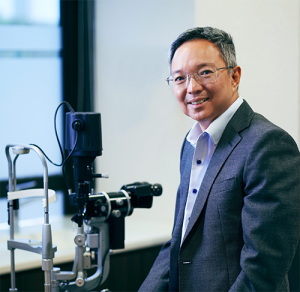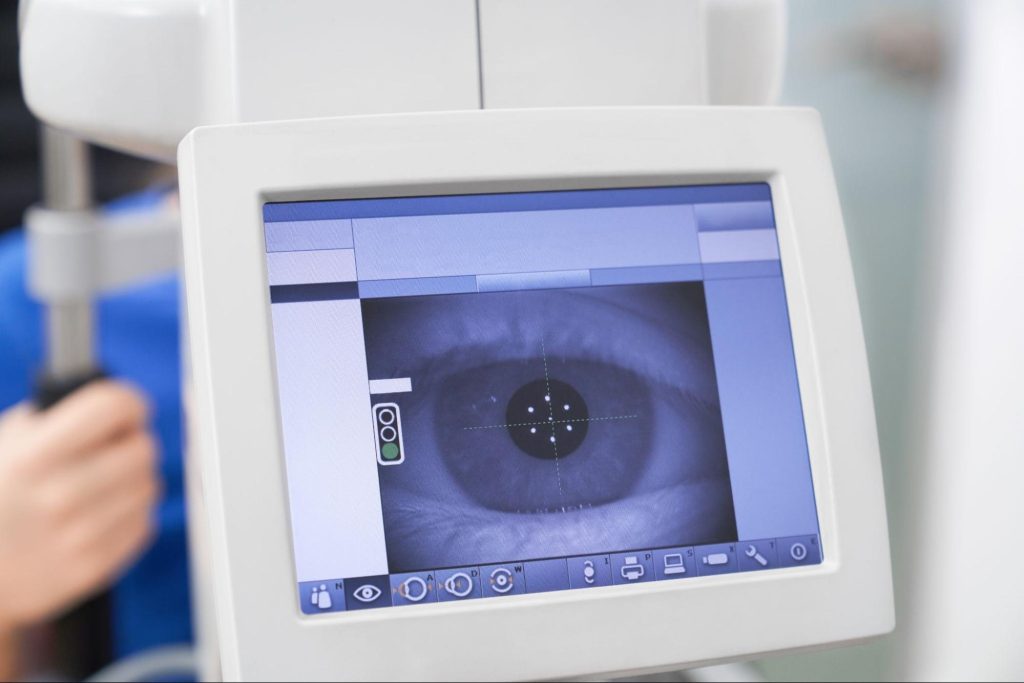When experiencing subtle blurring of a text, the occasional squinting, or the need for more light when reading, these can be early signs that their eyes are changing. While these changes might seem trivial, they underscore the rising risk of eye conditions as we age. That’s where the need for comprehensive eye screening comes in.
Most of us recognise the importance of regular health checks, but often, eye health is an area that’s overlooked. Especially in Singapore, where we’re exposed to screens daily, and our urban lifestyle can be demanding on our eyes, ensuring our eye health becomes paramount. So, what is eye screening, and how does it help adults aged 40 and older?
What to Know About Comprehensive Eye Screening for Adults
Undergoing periodic eye and vision examinations is essential in preventive health care. Many vision and eye problems have no obvious signs or symptoms. That’s why with routine eye screenings, specialists can detect if you are at risk of developing eye conditions, such as cataracts and diabetic retinopathy, early. A comprehensive eye screening typically involves checking your medical history, a visual acuity test, and an eye health evaluation of your eye’s structure and surrounding tissues.
For adults ages 40 through 64, it’s recommended that you get an eye health check at least every two years, and if you’re 65 and older, the recommended frequency is once every year.
The Benefits of Regular Eye Screening
Eye screening and check-ups are an important part of eye care; when you do it regularly, you can gain the following benefits:
1. Ensure Better Visual Function Through Age-Related Eye Changes
As we progress through various stages of life, our eyes undergo numerous transitions, ranging from changes in our ability to focus to alterations in lens clarity. These changes are inevitable but vary in degree and intensity across individuals. Regular eye screenings are not merely about assessing your ability to read letters off a chart. They track the intricate details of these age-related modifications, ensuring that you are equipped with the right visual aids, like glasses or contact lenses, that match your evolving needs. By closely monitoring these shifts, eye care professionals can offer tailored solutions, helping you experience life with the clearest vision possible.
2. Risk Assessment for Eye Conditions
Early detection is a vital factor in managing many eye conditions. Conditions like glaucoma, for instance, creep up silently and often become symptomatic only when significant damage has occurred. Through regular eye screenings, potential risks for such conditions can be identified, allowing for early interventions. By catching and addressing these threats upfront, we can significantly reduce the risk of vision loss or irreversible damage.
3. Detect Underlying Health Issues
Health issues can make a significant impact on our eye health; one example would be that hypertension can cause changes in the retinal blood vessels, while diabetes can lead to diabetic retinopathy. Therefore, regular eye screenings can pick up on these anomalies, often serving as the first line of detection for underlying health conditions. Upon detection, you can seek medical care proactively, even before other significant symptoms manifest.

4. Prevent Vision Loss and Blindness
The value of sight is immeasurable, and its loss can be devastating. Many conditions, when detected early through routine eye screenings, can be halted or slowed in progression. Macular degeneration, diabetic retinopathy, and other disorders can be managed more effectively when caught in the nascent stages. This early detection and subsequent treatment can be the difference between maintaining vision and experiencing significant vision loss or blindness.
5. Gain Lifestyle Recommendations on Caring for Your Eyes
Beyond identifying vision problems and providing corrective solutions, eye care professionals play an educational role. They offer invaluable advice on how to protect and care for your eyes daily. This might include guidance on dietary choices rich in eye-friendly nutrients, recommendations for protective eyewear when engaging in certain activities, or tips on minimising digital eye strain. Such lifestyle recommendations contribute to long-term eye health and can significantly reduce the risk of developing conditions related to external factors.
Make EyeWise Vision Your Partner in Maintaining Eye Health
Eye care isn’t just about seeing clearly; it’s about living a life where your vision isn’t a hindrance but an asset. The need for this is even more pronounced due to our fast-paced lifestyle in Singapore, exposure to digital screens, and urban environmental factors.
At EyeWise Vision, we prioritise comprehensive eye health checks. Beyond vision correction, our focus is on the long-term health of your eyes. Our specialists offer targeted eye screenings in Singapore, such as diabetic eye screenings, glaucoma screenings, and screenings for other pertinent eye conditions. With regular assessments and a meticulous approach tailored to your specific needs, we deliver quality service to maintain optimal eye health.
Should you want more eye care tips, check out our safety tips for individuals living with cataracts and how to manage your eye health when living with glaucoma.

Dr. Christopher Khng, specializes in Complex Cataract and Anterior Segment Reconstruction Surgery, in particular, Iris Reconstruction and surgery for Aniridia. His other areas of expertise include Complex Lens surgery, New Lens and Phacoemulsification technologies, Refractive surgery, Phakic IOLs (the Implantable Collamer Lens, ICL), and small-incision, topical anesthesia phacoemulsification cataract surgery. Dr. Khng is a member of the Singapore Medical Association (SMA), a Fellow of the American Academy of Ophthalmology, the American Society of Cataract and Refractive Surgery (ASCRS), and the European Society of Cataract and Refractive Surgery (ECSRS). He is registered with the Singapore Medical Council (SMC) in Singapore and with the General Medical Council (GMC) for practice in the United Kingdom.

